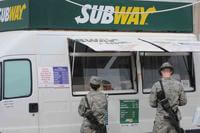Government officials often don't disclose the details of special operations missions until they're all over - if ever - and one last week was no different.
An elite team of chefs dropped into Afghanistan in time for Thanksgiving, the Army said, to prepare holiday meals for as many as 2,000 troops, including Army Special Forces soldiers and Navy SEALs. The official goal was to boost morale for the troops and give some pro tips to food service workers with the Combined Joint Special Operations Task Force, but the chefs said they got as much out of it as anyone on the ground.
"I've cooked for celebrities, politicians and statesmen - a variety of important people," chef Andrew Hunter told Military.com. "But this clearly was the most rewarding experience."
Hunter's view was echoed by Amy Sacco, known as the "Queen of New York nightlife" and founder of the city's Bungalow 8 nightclub and restaurant.
"It was probably the single most important thing I've done in my life - to take a trip like that," she said. "People were thanking me, but I was thanking them for letting me do this."
The cooking mission was the brainchild of retired Army Special Forces Master Sgt. Jeffrey Hinton, who has himself become a chef since leaving the military.
"Every time I went on a mission, I always thought about what I'd do when the mission was over - get a hot shower, a beer and some great food," Hinton said, explaining why he assembled the team. "The idea came to me while I was in culinary school. I thought it would be nice if I could give the guys some great food while they are downrange on their mission."
Hinton began planning the Thanksgiving deployment several months ago, working with Army Special Forces to make it happen.
But despite the general flood of pre-Thanksgiving official publicity across the Defense Department - which announced, for example, that servicemembers would be served some 168,000 pounds of turkey - Special Forces public affairs would not cooperate with reporters to get out word of the chefs' visits until after they were all over.
Hinton said the chefs did not prepare entire holiday meals on their own, but essentially used their skills and expertise to help the cooks assigned to the bases and camps. Many of the cooks, he said, held other military occupational specialties.
Hinton said the visit and the meal preparations gave his fellow chefs "a better understanding of what soldiers are going through, and an understanding of how they're eating over there."
Hinton drew his team from people he knew and those people, in turn, signed on others. Hinton signed on school chef de cuisine John Deflieze from Le Cordon Blue College of Culinary Arts in Scottsdale, Ariz., where Hinton trained.
Hunter, whose Culinary Craft food development company in Los Angeles includes clients such as Martha Stewart, Wolfgang Puck and Kikkoman, met Hinton through a mutual friend, an attorney who does work for the Green Beret Foundation.
Chef Dennis Foy, called a "founding father of American Cuisine" and the only other veteran in the group, is a moderator on Hinton?s website, where he oversees " The Gourmet Guerilla ." There members can discuss the pleasures of Grasshopper Fritters, Picante Squirrel and other delicacies.
Sacco was brought in by Foy, who mentored in her early days in the hospitality industry, she said.
In Afghanistan, the chefs divided up and hit bases in five provinces. While they brought many of their own knives and some other equipment, the meals themselves came from whatever food local units had on hand.
Sometimes things didn't go as planned. Hinton got to one base that was supposed to have several "steamship rounds" of beef, from which they would slice portions. In fact, there were none. Another base had 13, he said.
But as Special Forces troops - and chefs - are wont to do: they improvised and made do with whatever was available.
Hunter said that what chefs often bring with them is knowledge of what's possible, including how to cook something a bit differently, such as caramelizing the meat and how and when to season it.
"It was important to work with what the Army already had," he said. "And they had good stuff. I think there was a significant lack of vegetables, but there were tons of fruits -- strawberries, kiwis, grapes - And some decent meats. Definitely good products there, and the military clearly spends a lot of time and effort in getting quality food."
One of the high points for Hunter was getting an email from the father of one of the Special Forces troops he had cooked for.
"He said his son emailed him before to say "Some guy was here to cook for them." He thought it was neat but figured Army grub is Army grub," Hunter said. "[The son] emailed the dad after the dinner and said it was an amazing dinner, that it tasted great. So his father emailed me to thank me. That kind of stuff is really priceless."
Sacco, whose New York nightlife environment and lifestyle is far removed from Afghanistan and military experience, was moved after being presented with a certificate of thanks and an American flag flown over one of the camps where she cooked.
"I wasn't at all expecting it," she said. "The biggest thing would be to show my dad. He's a World War II veteran, a bombardier, and I am so excited to show him the certificate and the flag they gave me."
Online: ProfessionalSoldiers.com








